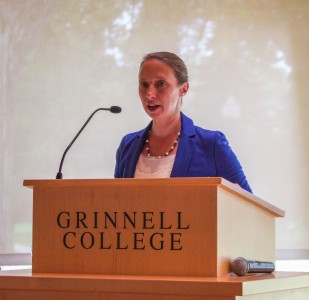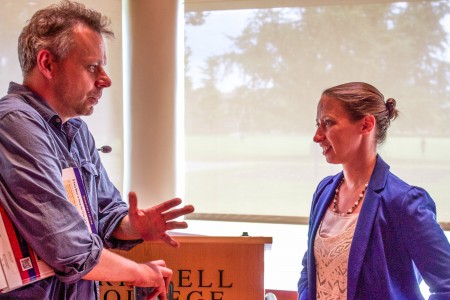On Wednesday, Sept. 24, JRC 101 hosted Tara Zahra, a MacArthur “genius” and history professor of the University of Chicago.
Zahra, a recently announced 2014 MacArthur Foundation Fellow, delivered Wednesday’s Scholars’ Convocation titled, “Exodus from the East: Emigration from Eastern Europe and the Making of the Free World.”

Photo by Sarah Ruiz.
Zahra’s research focuses on the history of modern Eastern and Central Europe, and is centered on depicting Eastern European history as part of the history of Europe as a whole.
The day prior to her convocation speech, Zahra sat with students in the living room of Mears Cottage for an informal discussion. At the session, students had the opportunity to ask her about her research and for advice on writing history. Zahra advocated the importance of learning foreign languages and mastering the art of writing through revision. She also emphasized the importance of good teaching and tight faculty-student relationships. In fact, Zahra is in the process of co-authoring a book with Peter Gunter, one of her undergraduate professors at Swarthmore College in Pennsylvania.
Zahra began her talk on a light note, with some nostalgia about her time as a student at Swarthmore, where she sat on the debate team with Professor Edward Cohn, History.
“I especially want to thank Ed Cohn for inviting me here … I met Professor Cohn myself 20 years ago when we were at Swarthmore College where we were on the debate team together. You never would guess, right? That we were debate nerds,” Zahra said.
During her talk, Zahra argued that historians tend to view the mid-to-late 19th century as a golden era of mobility between borders. According to this traditional narrative, it was not until after World War I that xenophobia in the West, the expansion of state power during the First World War and economic crises ended the era of open borders.
Zahra challenged this take on history in her convocation speech by providing evidence from Central and Eastern European perspectives.
“If we look at the story from the other side of the Atlantic and from the other side of Europe, a significant history of European immobility from the 19th century onward, powerful forces in both Europe and America conspired to curtail mobility for their own reasons,” Zahra said.
Zahra cited anti-Semitism, global racial hierarchies and political fears concerning the commoditization of human beings as factors contributing to policy limitations on emigration from Eastern European countries. In referencing tough working conditions in American factories and fields, Zahra argued that many Europeans who immigrated to America faced unlivable conditions. Eastern European governments therefore wanted to ensure their ethnic place in the global racial hierarchy by preventing more desirable citizens from leaving their homelands.

Photo by Sarah. Ruiz
“Beginning in the late 19th century in the Habsburg Empire, government officials and social reformers began to panic about the mass exodus of citizens from east to west,” Zahra said. “And from the very beginning, the emigration debate was linked to a much broader discussion about the meaning of slavery, freedom and free labor in the context of a globalizing labor market.”
Students in attendance, both history majors and non-majors, were excited to hear about Europe in the 20th century for personal and academic reasons.
“I went to the lecture because it was of personal interest to me,” said Mark Schwabacher ’17. “My grandmother’s town in Eastern Europe lost 50 percent of its population … [I liked that] she explored the duality of how governments were trying to push some people away while keeping other people.”
Zahra said that the audience at her talk on Wednesday was the largest she’s ever addressed. Many students thought that her presentation was informative and impressive.
“She was clearly a very intelligent woman and knew what she was talking about,” said Joey Kathan ’15. “She did a really nice job of presenting what she was arguing.”






















































